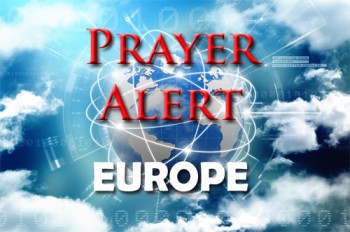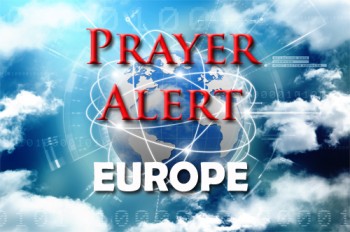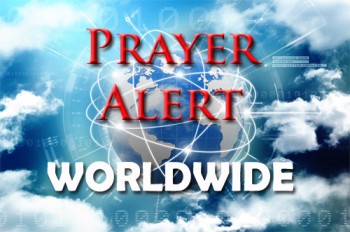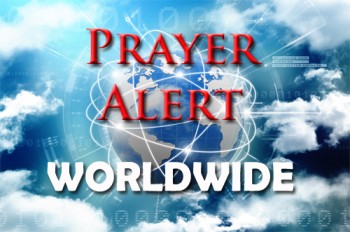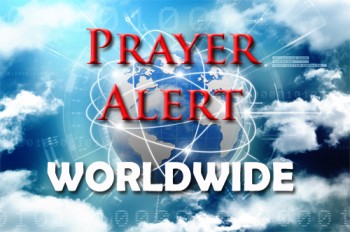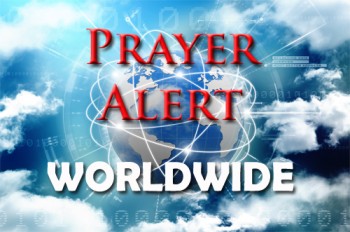
David Fletcher
David Fletcher is Prayer Alert’s Editor.
He is part of a voluntary team who research, proof-read and publish Prayer Alert each week.
If you would like to make a donation towards our running costs, please click here.
Rehman Chishti MP is to be the new Prime Minister's envoy for freedom of religion and belief. CSW has congratulated him on his appointment, saying, ‘He has always been outspoken on issues relating to freedom of religion or belief, and we look forward to working with him as he takes on this new role.’ Mr Chishti, a Muslim, was previously the vice-chairman of the Conservative party covering faith and communities, and was an outspoken critic of the Government's handling of Aasia Bibi's appeal for asylum. Foreign secretary Dominic Raab said, ‘A staggering 83% of the world's population live in nations where religious freedom is threatened or banned. It is an area where the UK can and must make a difference.’
Rehman Chishti MP is to be the new Prime Minister's envoy for freedom of religion and belief. CSW has congratulated him on his appointment, saying, ‘He has always been outspoken on issues relating to freedom of religion or belief, and we look forward to working with him as he takes on this new role.’ Mr Chishti, a Muslim, was previously the vice-chairman of the Conservative party covering faith and communities, and was an outspoken critic of the Government's handling of Aasia Bibi's appeal for asylum. Foreign secretary Dominic Raab said, ‘A staggering 83% of the world's population live in nations where religious freedom is threatened or banned. It is an area where the UK can and must make a difference.’
It smells of mud and damp. Mattresses, household appliances, chairs and broken tables are tossed outside on almost every street hit by last week’s worst storm in 140 years. Residents in Orihuela, one of many towns isolated by floods, couldn’t leave their homes for four days, fearing currents would drag them away. ‘We lost the car from the garage. We had food in the freezer, but people needed it and the emergency military unit took it.’ Pray for the areas still completely flooded and without electricity or water. Pray for the 3,500 who were evacuated, now returning to overwhelming destruction. €75 million was released to repair roads, bridges, homes, farms, schools, hospitals, health centres and businesses. ‘We cannot remove their suffering, but we can help them recover’, said regional president Juanma Moreno.
Jean-Claude Juncker has asked Britain to table ‘operable proposals in writing’ to the Irish Backstop. On 19 September the UK gave the EU written suggested solutions ‘reflecting the ideas the UK has put forward’ saying that the UK will table ‘formal written solutions when we are ready and not to an artificial deadline’. The UK will accept an all-Ireland food and agricultural zone to avoid the need for many checks, but Barnier said that the EU must control products arriving to the single market, insisting Brexit must include the backstop or equivalent legally-binding guarantees. The EU parliament will never accept any agreement giving the UK advantages of free trade without aligning with European standards. ‘We are not stupid, we will not kill our own companies.’ Nigel Farage said Barnier’s objective is ‘keeping us trapped inside, fearing - if we break out of the single market - we would become wealthier outside the EU’.
If written words meant nothing to you, how would you hear and understand the gospel? 1,961 unengaged and unreached people groups, totalling 5.7 billion people, are oral learners who do not know a single verse of Scripture in their native language. Pray for the mission agencies developing strategies to reach these unreached people with God's word. Pray for churches overseas to engage with these people groups in their area through methods specific to their worldview and culture. Pray for organisations like Wycliffe Bible Translators, who are impacting unreached people groups globally with oral Bible storytelling and audio recordings of Scripture. It is time that all nations, tribes and languages not only hear about Jesus, but also experience him through God’s transforming Word.
When the Burkinabe people gained independence in 1960, the motto ‘Unity, progress, justice’ embodied hope for them. Currently almost eighty ethnic groups embrace religious practices: earth priests, fortune tellers, healers, witchcraft, and animal sacrifice. Recently the president of the Episcopal Conference said that over 200 churches have closed in the north of the country to avoid attacks. If the world continues to do nothing, the result will be the elimination of a Christian presence. Muslims and Christians had enjoyed a peaceful coexistence. But this once-peaceful country has turned into a hotbed for extremism, and a long-held peace is under threat. Christians were specifically targeted in recent attacks. The violence has taken hundreds of lives (Muslim and Christian) and displaced tens of thousands more, as Islam rapidly spreads into nearly every ethnic group. Unreached peoples are steadily turning to Islamic teachings.
On 19 September 30+ civilians were killed and 40+ injured in an air attack that accidentally targeted farmers, and 20+ people were killed in a suicide car bomb that hit a hospital. 74 Afghans were killed every day during August. Unrelenting violence affects almost the entire country. The US/Taliban peace talks have failed, attacks are killing dozens in Kabul, militant sieges trap residents in Kunduz and Pul-e-Khumri, airstrikes by security forces kill innocent civilians, and the Taliban have executed a rights commission’s provincial director. Conflict has displaced 237,000+ people this year, and recent floods following extreme drought have uprooted comparable numbers. Hundreds of thousands of refugees are being forced home, increasing the burden on a fragile state with lowering income, high unemployment, and rising debt. Three million people are experiencing food insecurity; one in six need humanitarian assistance. But in the midst of crises, many displaced Afghans are becoming Christians. See the following article, on suffering but growing church.
We praise God that hundreds of new Iranian and Afghan believers have been baptised in recent months in cities across the region. In Iran, these include teenagers who were deeply impacted recently by an Elam youth discipleship conference. The baptisms have been occasions of great joy and celebration, often lasting from morning to evening. Over 100 more new believers will be baptised soon at a service in Afghanistan. Please pray that all these new believers will grow in love and knowledge of Christ, and that God will protect them and give them wisdom as they witness to family and friends.
This month a US court sentenced Anthony Schultz to 84 years in prison for filming rape and sharing the abuse online. The case dated back to 2016, when he was arrested for multiple counts of child pornography he created in the Philippines. US-based FBI investigators discovered Schultz would film himself abusing children and then sell the materials online. He also convinced a Filipino mother to sexually abuse her own daughter and sell the videos to him. Throughout 2017 the International Justice Mission (IJM) supported Philippine authorities as they used this intelligence to rescue three girls aged 10, 15 and 17 from Schultz’s videos. While we can praise and thank God for the success of this investigation, please pray for the release of thousands of other children in similar circumstances across the nations. Pray for the work of IJM as they work to end slavery in our lifetime.
A believer says the Chinese government doesn’t want Christians to know the Ten Commandments, which have been removed from nearly every state church and meeting venue and replaced with quotations from a 2015 speech by Xi Jinping. The government said that the core socialist values and Chinese culture will swallow religions of China and support religious communities to re-interpret religious thought, doctrines, and teachings in a way that conforms to the progress of the times. This means resolutely guarding against the infiltration of Western ideology, and consciously resisting the influence of extremist thought. Some churches have been closed for not replacing the Ten Commandments with the President’s quotes. Others have been threatened with blacklisting, which means that travel, schooling, and their children’s future employment will be impeded if they refuse to overhaul their church's teaching. A pastor said, ‘The Communist Party’s ultimate goal is to become God’.



